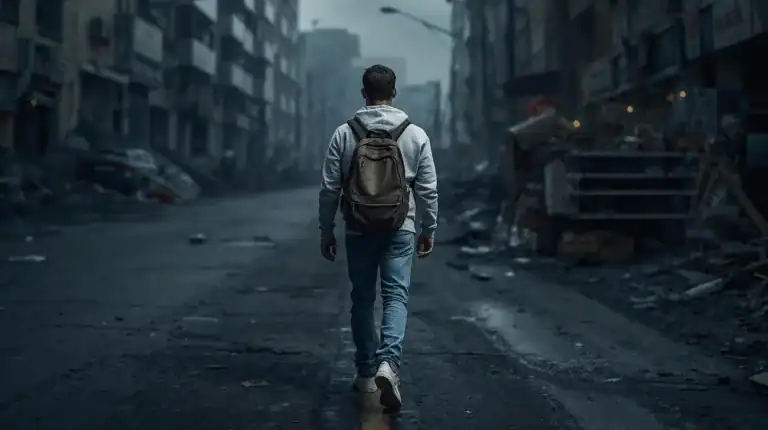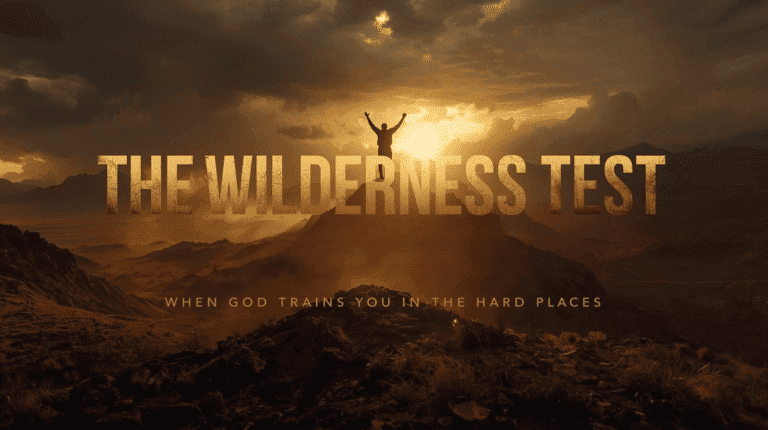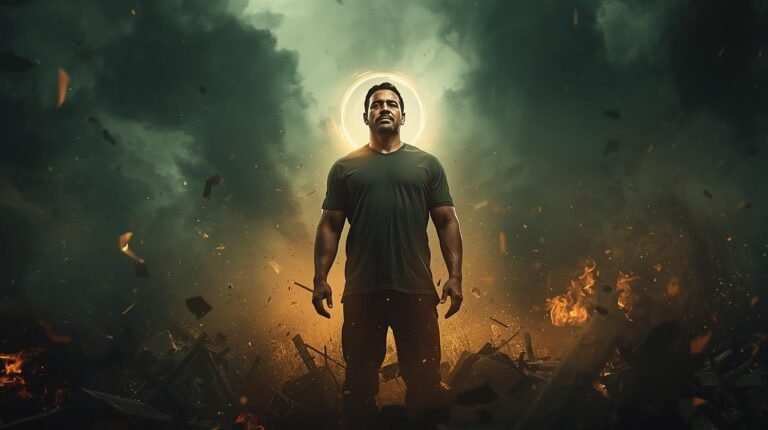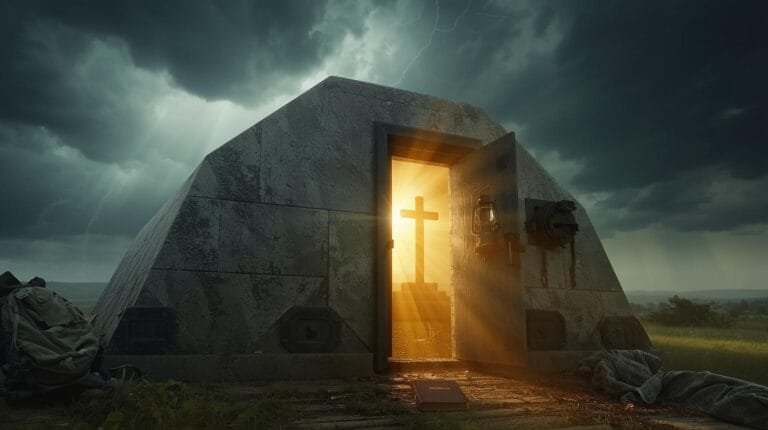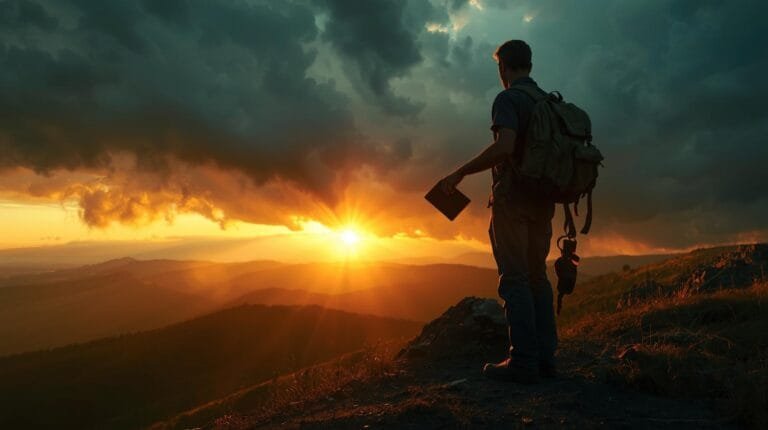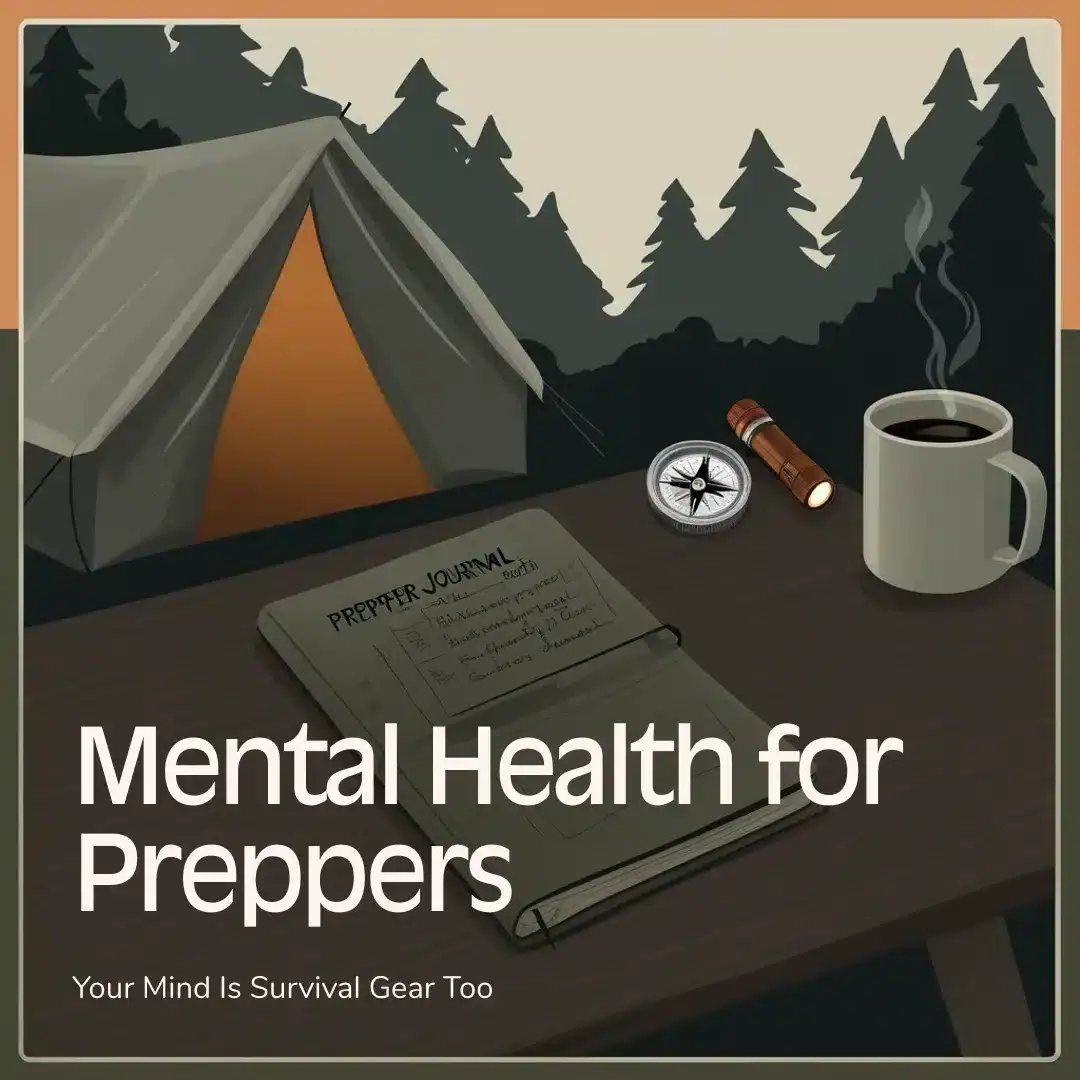
Prepping Your Mind: Why Mental Health Is Survival Gear Too
You’ve got the bug-out bag.
You’ve got the water filters, the paracord, the tactical spork that could probably double as a medieval weapon. You even stocked enough peanut butter to survive three apocalypses and still barter a jar or two.
But here’s the survival gear most people forget to pack: their mind — and their spirit.
In every end-of-the-world story, the real killer isn’t the asteroid, the flood, or the mutant raccoon uprising. It’s panic. It’s fear. It’s the mental spiral that makes smart people do dumb things, like sprinting into the woods at night without shoes because “I thought I heard something.”
Prepping without preparing your heart and your head is like buying a $400 flashlight and forgetting the batteries. Even the best prepper flashlight won’t help if you’re too stressed, scattered, or broken in spirit to remember where you put it.
That’s why prayer and peace of mind are just as important as food, fire, and shelter. Gear runs out. Batteries die. But a mind rooted in calm and a heart grounded in faith can steady you when everything else falls apart.
So let’s shine a light on the survival tool that doesn’t fit in your pack but determines whether the pack even matters: your mindset — strengthened by prayer, discipline, and trust.
What Is Mental Health Preparedness, Really?
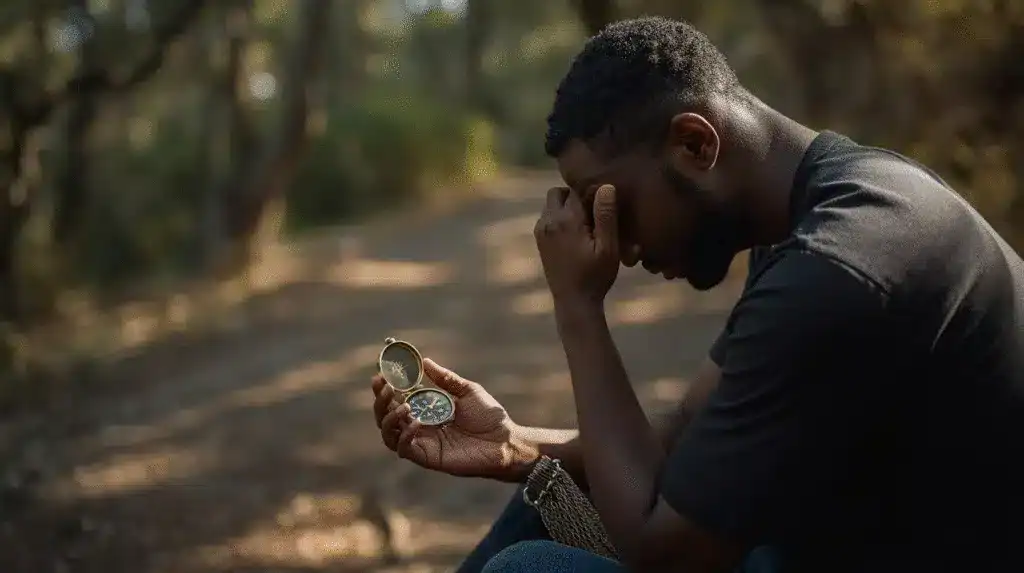
“Mental health preparedness” might sound like something a counselor would mention in a quiet office, but in the prepping world it means one thing: keeping your head and heart steady when the world goes sideways.
So what does that look like in real life?
It’s:
- When the trail disappears, prayer is your anchor; the compass and map just point the way.
- Thinking clearly enough to ration food and water instead of stress-eating your way through three days of supplies in one sitting.
- Making smart calls under pressure instead of panicking and becoming a cautionary tale around the campfire.
Mental preparedness isn’t about being unshakable. It’s not about stuffing down fear or pretending you’ll never feel overwhelmed. That’s Hollywood fantasy.
Real mental preparedness is about:
- Resilience → bouncing back after setbacks, whether it’s a dead flashlight, a sprained ankle, or an unexpected storm.
- Adaptability → shifting gears when Plan A burns down, Plan B blows away, and all you’ve got left is prayer, duct tape, and determination. Think MacGyver in this situation!
- Focus under fire → sorting out what matters right now (water, warmth, safety) from what can wait (repacking your bag for the tenth time).
Think of it like this: you train with your firestarter so you don’t freeze when your lighter fails. You practice land nav so you don’t wander in circles. Prayer and mental prep are no different — you rehearse calmness, clarity, and trust so your mind and spirit don’t fail before your gear does.
Why Mental Health Is Your First Line of Defense
Panic Is Deadlier Than Hunger
There’s an old saying: you can survive three weeks without food, three days without water, but only three minutes without hope and clear thinking. Panic is the thief of survival. It hijacks your breath, clouds your judgment, and drives you straight into mistakes that nature won’t forgive.
Lost hikers don’t starve to death in a day — they collapse because they sprint in circles, waste precious daylight, and burn every ounce of energy they had left. When the grid goes down, panic doesn’t push people toward water filters or canned beans; it drives them to loot flat-screen TVs (think Hurricane Katrina) while their families go thirsty.
Panic makes the strong weak and the prepared foolish. That’s why the first act in any crisis should be the simplest: stop, breathe, and pray. Faith steadies the heart, slows the mind, and gives you back those three minutes panic tries to steal.
Stress Makes You Sloppy
Stress is sneaky. It doesn’t knock you out with one big punch — it chips away at your sharpness until you’re fumbling with laces, spilling water, and setting your own socks on fire because you got too close to the camp stove.
Out in the field, little mistakes snowball. Drop your compass in a stream, forget to refill your bottles at the last creek, lose track of your bearings because your mind’s spinning. That’s not bad luck — that’s stress eating away at focus.
The hard truth? Stress turns a stocked bug-out bag into dead weight if you can’t keep your head together. But prayer, discipline, and deliberate calm are like sharpening a knife — they keep your edge keen when the world tries to dull it.
Burnout Is Real (Even for Preppers)
Burnout isn’t dramatic — it’s a slow leak. It looks like endless nights scrolling doomsday headlines, maxing out credit cards on gear you’ll never use, or drilling so hard you forget to rest. You burn your spirit down in the name of being “ready,” and by the time a real storm rolls in, you’re already spent.
Prepping isn’t a sprint to the apocalypse; it’s a marathon of steady faith and wise action. Even the Bible reminds us that “six days you shall labor, and on the seventh you shall rest.” Rest isn’t laziness — it’s survival.
The strongest prepper isn’t the one with the most gear, but the one who knows when to pause, breathe, pray, and let their mind recover. Because when your spirit is fried, your gear can’t carry you.
How to Strengthen Mental Health as a Prepper
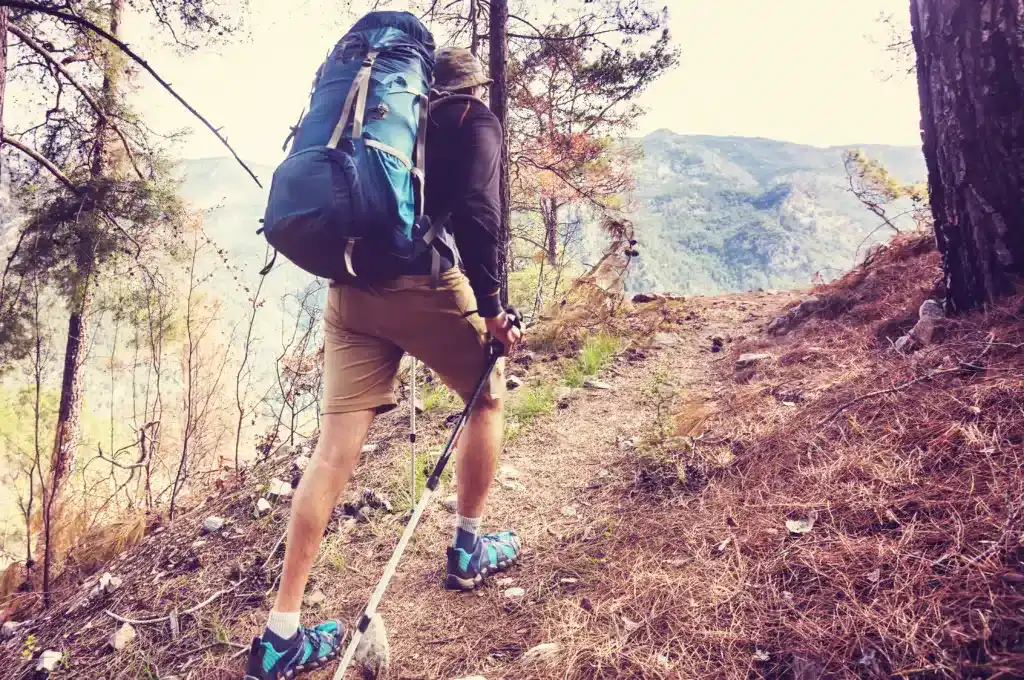
Gear matters. Skills matter. But none of it holds up if your mind buckles under pressure. Training your spirit and your head is as essential as sharpening a knife or packing a bug-out bag. Here’s how to build resilience that lasts longer than your peanut butter stash.
1. Prayer and Breathing: The Reset Button
When chaos hits, your body’s first move is panic: heart racing, chest tightening, thoughts scattering like birds from a tree. That’s when you need to anchor yourself.
Start with prayer. Not as a last-ditch cry, but as your first line of defense. Prayer recenters your focus, reminds you you’re not walking through the dark alone, and steadies the spirit so the body can follow. Pair it with breathing — slow inhales, long exhales — and you’ve just hacked your nervous system.
Try box breathing in the quiet moments before crisis strikes: inhale for 4, hold for 4, exhale for 4, hold for 4. Think of it as tactical faith training — prayer for the soul, breath for the body.
2. Sleep: The Fuel You Can’t Stockpile
Preppers often brag about running bug-out drills through the night. Sounds tough, but reality is harsher: without sleep, your brain turns into mashed potatoes. Exhaustion blurs maps, botches fire-starting, and tempts you into dumb risks like cooking inside a nylon tent because “it seemed faster.”
God designed rest for a reason. Even the most hardened warrior needs it. Treat sleep as survival gear — because it is. Rotate watches if you’re in a group, build downtime into your training, and stop treating exhaustion like a badge of honor. The best prepper flashlight won’t help if you’re too groggy to aim it in the right direction.
3. Train Until It’s Second Nature
In chaos, your brain doesn’t rise to the occasion — it falls to the level of its training. That’s why soldiers drill the same motions over and over until they can do them half-asleep.
Preppers should do the same. Practice fire-starting until it’s boring. Run land nav drills until you could walk a bearing in your sleep. Filter water until you don’t think, you just do. Faith and repetition combine to quiet panic — you’ll know in your bones, I’ve done this before, I can do it again.
4. Move Your Body, Steady Your Mind
Fitness isn’t about six-pack abs — it’s about resilience. A body that can ruck uphill, split firewood, and haul water is a body that won’t crumble when it matters most.
Exercise also resets the mind. Movement burns off stress hormones, sharpens thinking, and reminds you that strength isn’t just in your pack — it’s in your frame. Even a 20-minute walk can double as prayer time and mental conditioning. A strong body supports a strong spirit.
5. Don’t Prep Alone: Build Your Tribe
The lone-wolf fantasy makes for good movies, but in real life, wolves starve. Humans survive in groups. Mental health thrives in fellowship.
Having someone to watch your back, trade skills, and pray with under pressure is worth more than all the ammo you can stockpile. Scripture reminds us: “Two are better than one, because if either falls, one can help the other up.” Survival isn’t just about independence — it’s about interdependence.
So find your tribe. Family, trusted friends, or a circle of fellow preppers. A shared laugh, a shared prayer, or just someone to say “we’ve got this” can turn panic into peace.
A Real-World Mental health Preparedness Test
Picture this: You’re three miles into the backcountry. The sun sinks fast, the trail vanishes, and your phone? No signal. Just dead weight.
Without mental preparedness: Panic takes over. You crash through brush, waste energy, and burn daylight. Stress skyrockets, you forget to sip water, and exhaustion closes in.
With mental preparedness: You stop. You pray. You breathe. You remember that fear isn’t fatal — poor choices are. You pull out your compass, sip water slowly, check the map, and make a plan. Calm, prayerful choices keep you alive.
That’s the difference. Not fearlessness — but faith and discipline turning fear into focus.
Gear That Helps Support Mental Health
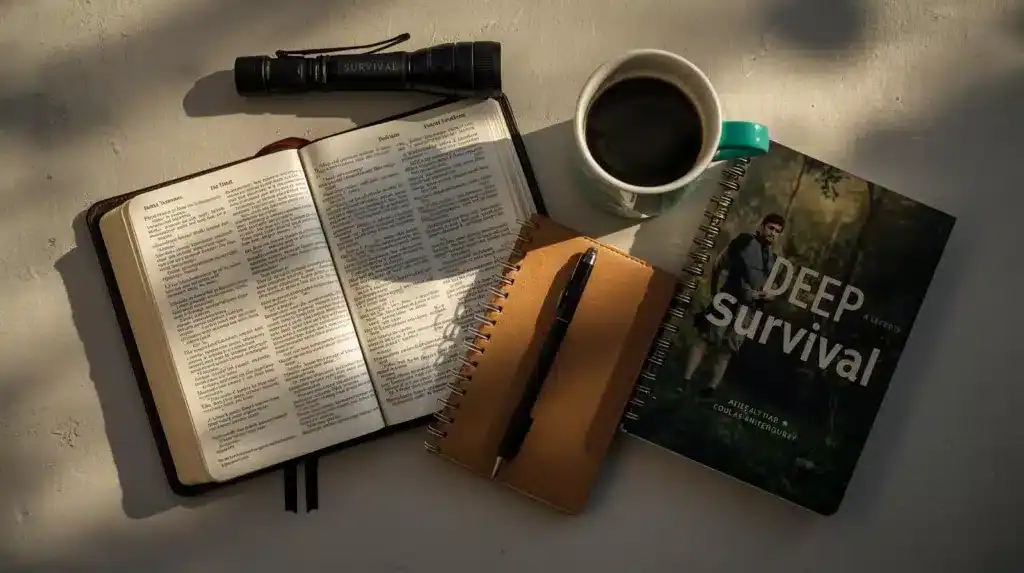
Even though the mind and spirit are the main tools, the right gear can help keep your head clear and your heart steady.
- Rite-in-the-Rain Notebook → Writing lowers stress and organizes scattered thoughts. Jotting down prayers, plans, or even a list of “don’t forgets” gives your mind structure when chaos sets in.
- Books on Survival Mindset → Deep Survival by Laurence Gonzales or The Unthinkable by Amanda Ripley. These aren’t bedtime stories; they’re lessons from real people who kept their heads when everything went wrong.
- The Bible → It’s more than paper and ink. In a blackout, flood, or personal storm, Scripture offers guidance, encouragement, and calm. Reading Psalms by lantern light can reset your spirit faster than any pep talk. When anxiety hits, prayer and Scripture are the best morale kit you’ll ever carry.
- Reliable Flashlight → Darkness stirs anxiety. The best prepper flashlight isn’t just for finding your way — it calms nerves, restores order, and makes the night less intimidating.
Wrapping It Up: Mental Health Is Survival Health
Everyone stocks food and ammo. Few stock patience, prayer, and peace of mind. But the truth is simple: the best prepper flashlight can pierce the dark, but prayer and resilience cut through panic.
Mental preparedness is survival preparedness. It keeps you steady when the trail disappears, when storms hit, when the silence of a blackout presses in.
So prep your food, your water, and your gear — but prep your spirit too. Because survival isn’t just about what’s in your bag. It’s about what’s in your head and your heart.
FAQs on Mental Health for Preppers
Q: Why talk about mental health on a prepping blog?
Because gear can’t fix a scrambled brain. You can have the best-stocked pantry, the sharpest knife, and the biggest armory in the world — but if panic drives you into chaos, it won’t matter. Panic kills faster than hunger, thirst, or even cold. Mental health is the filter that determines whether your prepping pays off or falls apart. And just like you sharpen tools, you sharpen your mind and spirit with prayer, practice, and discipline.
Q: How do I train mental resilience?
Start small, start daily. Practice prayer and breathing when life is calm, so they’re second nature when life isn’t. Build routines, like journaling or daily walks, that strengthen both body and spirit. Push yourself with training — practice fire-starting in the rain, ruck when you’re tired — not because it’s fun, but because it builds confidence you can lean on later. Mental resilience isn’t built in a crisis; it’s stored up, like water in a cistern, and drawn out when the drought comes.
Q: What’s the biggest mental trap for preppers?
Burnout. Prepping without balance is like running on a treadmill that never stops. Doom-scrolling the news, spending every dollar on gear, or living in constant fear of “what if” will wear you out before anything even happens. The cure? Rest. Faith. Balance. Prepping is a long haul, not a sprint. Take the Sabbath seriously: one day of rest restores six days of work. If you ignore that rhythm, you’ll burn out before the storm ever rolls in.
Q: Is mental health really “gear”?
Absolutely. Call it invisible gear. Your flashlight, knife, or pack only matter if you have the clarity to use them wisely. Think of prayer and mental focus as the first items in your kit — unseen but vital. When fear fogs your mind, prayer clears it. When stress makes you sloppy, focus steadies your hands. When despair tries to knock you down, resilience helps you stand. It may not fit in your bug-out bag, but it fits in your survival.
Q: Can gear help mental health?
Yes — because order calms chaos. Light in the darkness quiets fear. Writing down a plan steadies a racing mind. The best prepper flashlight isn’t just a tool for vision; it’s peace of mind when the night feels overwhelming. A notebook helps you pray, plan, and track instead of spiraling. A trusted book on survival mindset reminds you others have endured worse and lived to tell it. Gear doesn’t replace mental health, but the right gear supports it.
Affiliate Note
Heads-Up, Fellow Preppers: Some links in this post are sponsored or affiliate links. If you click and buy, I may earn a small commission—enough to restock my peanut butter and maybe add one more can of chili to the stash. I only recommend gear I trust, use, and would put in my own bug-out bag.


